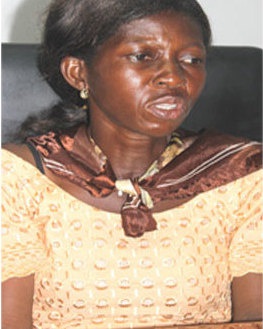When she walked into our newsroom seven months ago, she came heavy-laden with big problems. She was a stigmatized HIV positive victim, so overwhelmed by her sorrow she broke down in frustration: I want to die. We hoped succour would come her way, after all, God is ever faithful and would not leave the afflicted in the lurch.
Alas, when she reappeared three months later in September, her situation had worsened to the extent that the expression “Double Jeopardy” seemed made for her. Co-tenants, neighbours, families, and even her landlord were making life difficult for her by their discriminatory attitudes towards her.
At her appearance again this week, she came with the usual gloomy outlook. Lo and behold, her predicament has acquired a tincture of doomsday quality so much so that you can’t help but fear for her sanity, a fear that she might be driven to suicide by frustration.
That is the sad story of Joycelyn Tsekumah, a 43-year-old petty trader in Madina Market, Accra. On top of her insurmountable trouble, she is now effectively a homeless person after her landlady refused to renew her GHc30-a-month occupancy at the expiration of her rent by November.
Her problem is not so much her inability to pay her rent as it is a case of blatant discrimination and cold resolve to get rid of her. As far back as June, the landlord made clear her intention to see the back of her as soon as her lease lapsed.
Like a person drowning, Tsekumah, who is desperately grasping at every straw has taken her case to the Rent Control Department and has been granted the standard three-month reprieve to give room for possible compromise with her landlady.
She is smart, however, not to pin her hopes on the fragile intervention that Rent Control offers. More likely than not, that will lead nowhere but to a blind alley, especially against the background of the stigmatization and harassment she has suffered in the past from the landlady and other co-tenants.
She has explored the possibility of seeking an alternative accommodation elsewhere but the going rates for rent, even for modest accommodation, is out of her reach.
The cheapest accommodation in her range so far is a room of GHc45 a month.
“I don’t have that kind of money, because they are asking for two-year advance. I don’t know where I can get it from. I don’t have anybody. I am all alone,” she lamented, practically to tears.
When life was good, Tsekumah, a native of Kpando, in the Volta Region, previously worked as a security guard, first, at Ghana Lands Commission, and, later, at the Kofi Annan International Peace Keeping Training Centre, Teshie.
Her sad odyssey started with her unfaithful husband, Ben Adzraku, who after infected her with HIV, absconded in 2005, leaving her to shoulder the burden of raising their then five-year-old son.
She had managed to cope with her health situation until stigmatization set in and she became the target of discrimination in her neighbourhood. As her HIV status became common knowledge, her plight worsened to the point that the scorn further complicated her health situation.
“Even after telling the world my story, letting them know I did not live a bad life, they still taunt me day and night, insulting me and my children openly,” she once lamented.
Earlier in September, she affirmed that living in the house she occupied at Adenta was like hell and she would heave a huge sigh of relief the day she gets another accommodation elsewhere.
Today, her case is like someone trapped between the devil and the deep blue sea.
In the absence of a timely help, she will definitely end up on the street.
“I don’t know if I will last till tomorrow morning. I don’t even know how long I can last on the street,” she cried.
For her, there may not be tomorrow.
General News of Monday, 8 December 2014
Source: Weekend Sun Newspaper
Out in the cold! landlord kicks out HIV patient













